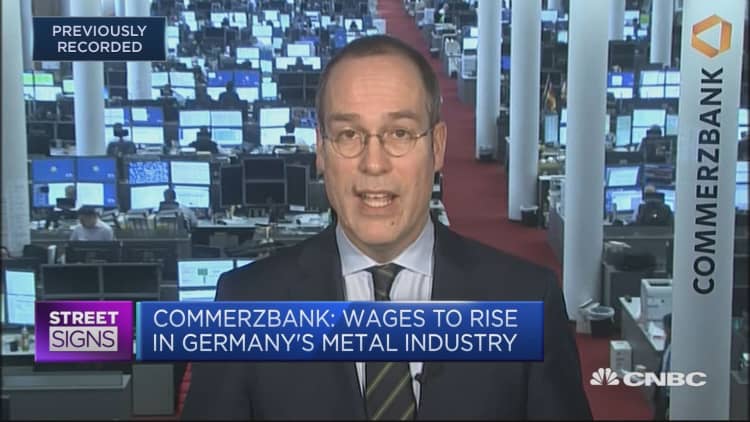
Germany could break away from years of fiscal discipline and become less of an economic example, amid plans by its new government to increase spending, analysts told CNBC.
The largest euro zone economy has accustomed the world to running budget surpluses — when income or receipts overcome expenditures — or even small deficits compared to the rest of the region. Data released in January showed that Germany's public sector hit a record surplus of 3.4 billion euros ($4.24 billion) in 2017, indicating that the government has room to step up spending.
However, analysts are concerned that increasing spending, which the new government aims to do by 48 billion euros, could be detrimental in the eventuality of economic shocks.
"As long as the German economy continues to grow at such strong rates and I expect this to continue for two to three years, I do not expect a deficit," Joerg Kraemer, chief economist at Commerzbank, said Wednesday. "However, if something happens, and growth slows down, then we are quickly back in deficit territory as a new government will spend all the extra tax revenues for consumption."
The last time Germany ran up a deficit, defined as the amount by which expenses or costs exceed income or revenues, was in 2013 by 0.1 percent of gross domestic product.
According to Commerzbank, the coalition deal between Chancellor Angela Merkel's Christian Democrats (CDU) and the Socialist Democrats (SDP) will prove "costly." With a more relaxed approach to spending, should an economic shock occur, which could include a market sell-off and changes in monetary policy, Germany could be in trouble, the bank said.
"I would say two-thirds of their agenda, of the new grand coalition, is in economic policy terms determined by the Social Democrats and they took three important ministries, including the very influential finance ministry," Kramer said.
Commerzbank said last week in a note that the vast additional expenditure "would imply budget deficits if the economy and interest rates were to normalize."
Central banks across the world have started reversing their ultra-loose monetary policy, although this is expected to be implemented at a slower pace in the euro zone.
Daniel van Schoot, economist at RaboResearch, said Thursday that although there is the economic risk that Germany will spend too much over the government's four-year term, he doesn't think that it will garner enough political support.
Merkel and her party would not allow it and Olaf Scholz, who has been tipped as the next finance minister, seems committed to following Berlin's traiditonally strict financial path, van Schoot told CNBC over the phone.

The CDU has defended the coalition deal with the SPD. Michael Fuchs, a former member of parliament with Merkel's CDU, said Tuesday that he is optimistic that Germany's finances will continue to be run efficiently.
"In the coalition contract, which we do have at the moment, it's very clearly stipulated that there will be no new debt at all," Fuchs said. "Like we did in the last four years, we've run the budget result without any debt and we want to continue to do so."
Germany has traditionally been criticized, including by the International Monetary Fund and the European Commission, for not using its fiscal space to boost investment and help the high-indebted euro area. But the grand coalition is set to change that with plans to invest nearly 50 billion euros in additional expenditure.
"I would completely disagree (with comments that such additional spending could cause a deficit)," said Carsten Brzeski, chief economist at ING, adding that the grand coalition could have been "more ambitious."


